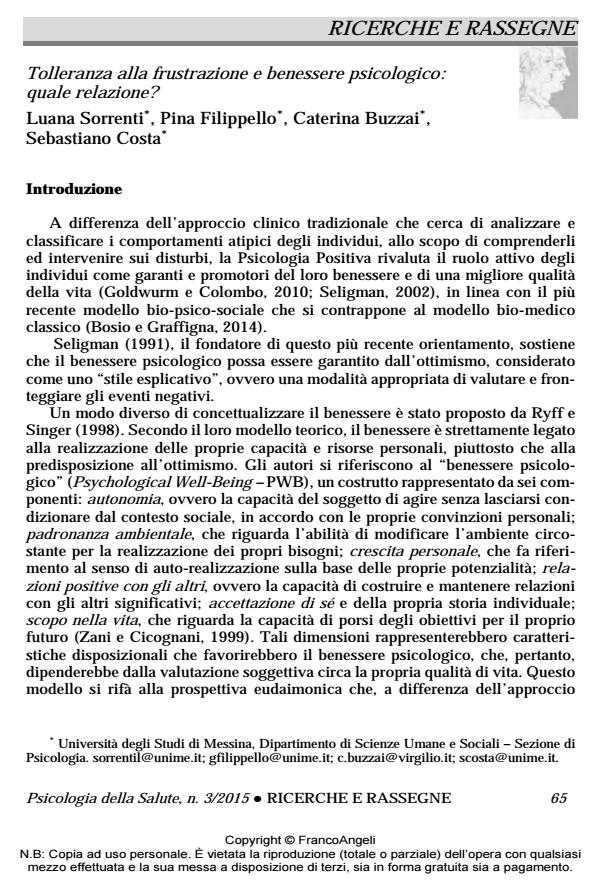Frustration tolerance and psychological well-being: what relation?
Journal title PSICOLOGIA DELLA SALUTE
Author/s Luana Sorrenti, Pina Filippello, Caterina Buzzai, Sebastiano Costa
Publishing Year 2015 Issue 2015/3
Language Italian Pages 22 P. 65-86 File size 178 KB
DOI 10.3280/PDS2015-003004
DOI is like a bar code for intellectual property: to have more infomation
click here
Below, you can see the article first page
If you want to buy this article in PDF format, you can do it, following the instructions to buy download credits

FrancoAngeli is member of Publishers International Linking Association, Inc (PILA), a not-for-profit association which run the CrossRef service enabling links to and from online scholarly content.
The purpose of this study is to investigate the relationship between the dimensions of psychological well-being and frustration intolerance beliefs. Specifically, it was assumed that a higher level of frustration intolerance (emotional intolerance, entitlement, discomfort intolerance, and achievement frustration), corresponds to a lower index of both psychological wellbeing and its dimensions. A further objective was to investigate the presence of gender differences and the possible correlation with age in the variables considered in order to improve scientific knowledge in a field of investigation by the results still not uniform. At this research 200 university students participated (sampled in the universities of Messina and Reggio Calabria). For the evaluation of the variables considered were used Italian versions of Psychological Wellbeing Scale (PWB) (Ryff, 1989; Ruini et al., 2003) and the Frustration Discomfort Scale (FDS) (Harrington, 2005a; Filippello et al., 2014). The results partially confirmed the initial hypotheses. As to gender differences, women have presented both a lower well-being and a greater frustration intolerance than men. As for the age, there is a negative correlation with the beliefs of emotional intolerance, entitlement, and discomfort intolerance. Finally, the analysis of regression showed that some dimensions of intolerance to frustration (emotional intolerance and discomfort intolerance) are negatively predictors of psychological well-being. Conversely, the perfectionist beliefs (achievement frustration) influence it positively. Further longitudinal studies would be necessary in order to deepen and confirm the result obtained.
Keywords: Psychological well-being, frustration intolerance, positive psychology, gender and age differences
- Learned helplessness and mastery orientation: The contribution of personality traits and academic beliefs Luana Sorrenti, Pina Filippello, Caterina Buzzai, Chiara Buttò, Sebastiano Costa, in Nordic Psychology /2018 pp.71
DOI: 10.1080/19012276.2017.1339625 - The Relationship Between Contextual and Dispositional Variables, Well-Being and Hopelessness in School Context Caterina Buzzai, Luana Sorrenti, Susanna Orecchio, Davide Marino, Pina Filippello, in Frontiers in Psychology 533815/2020
DOI: 10.3389/fpsyg.2020.533815 - School Refusal and Absenteeism: Perception of Teacher Behaviors, Psychological Basic Needs, and Academic Achievement Pina Filippello, Caterina Buzzai, Sebastiano Costa, Luana Sorrenti, in Frontiers in Psychology 1471/2019
DOI: 10.3389/fpsyg.2019.01471 - Group cohesion, motor self-efficacy, and socio-emotional skills in physical education students in a region of Spain: a descriptive study María José García-Guillén, Antonio Castillo-Paredes, Carmen Galán-Arroyo, Jorge Rojo-Ramos, in Frontiers in Psychology 1631231/2025
DOI: 10.3389/fpsyg.2025.1631231
Luana Sorrenti, Pina Filippello, Caterina Buzzai, Sebastiano Costa, Tolleranza alla frustrazione e benessere psicologico: quale relazione? in "PSICOLOGIA DELLA SALUTE" 3/2015, pp 65-86, DOI: 10.3280/PDS2015-003004